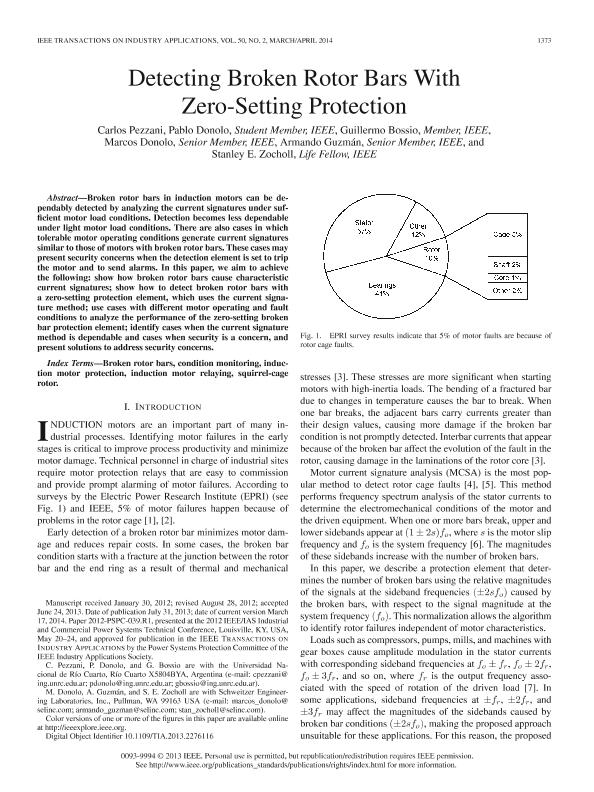Mostrar el registro sencillo del ítem
dc.contributor.author
Pezzani, Carlos Martín

dc.contributor.author
Donolo, Pablo Daniel

dc.contributor.author
Bossio, Guillermo Rubén

dc.contributor.author
Donolo, Marcos
dc.contributor.author
Guzmán, Armando
dc.contributor.author
Zocholl, Stanley
dc.date.available
2020-04-17T20:08:34Z
dc.date.issued
2014-03
dc.identifier.citation
Pezzani, Carlos Martín; Donolo, Pablo Daniel; Bossio, Guillermo Rubén; Donolo, Marcos; Guzmán, Armando; et al.; Detecting broken rotor bars with zero-setting protection
; Institute of Electrical and Electronics Engineers; Ieee Transactions on Industry Applications; 50; 2; 3-2014; 1373-1384
dc.identifier.issn
0093-9994
dc.identifier.uri
http://hdl.handle.net/11336/102970
dc.description.abstract
Broken rotor bars in induction motors can be dependably detected by analyzing the current signatures under sufficient motor load conditions. Detection becomes less dependable under light motor load conditions. There are also cases in which tolerable motor operating conditions generate current signatures similar to those of motors with broken rotor bars. These cases may present security concerns when the detection element is set to trip the motor and to send alarms. In this paper, we: Show how broken rotor bars cause characteristic current signatures. Show how to detect broken rotor bars with a zero-setting protection element, which uses the current signature method. Use cases with different motor operating and fault conditions to analyze the performance of the zero-setting broken bar protection element. Identify cases when the current signature method is dependable and cases when security is a concern. Present solutions to address security concerns.
dc.format
application/pdf
dc.language.iso
eng
dc.publisher
Institute of Electrical and Electronics Engineers

dc.rights
info:eu-repo/semantics/openAccess
dc.rights.uri
https://creativecommons.org/licenses/by-nc-sa/2.5/ar/
dc.subject
INDUCTION MOTOR PROTECTION
dc.subject
BROKEN ROTOR BARS
dc.subject
SQUIRREL CAGE ROTOR
dc.subject
INDUCTION MOTOR RELAYING
dc.subject.classification
Ingeniería Eléctrica y Electrónica

dc.subject.classification
Ingeniería Eléctrica, Ingeniería Electrónica e Ingeniería de la Información

dc.subject.classification
INGENIERÍAS Y TECNOLOGÍAS

dc.title
Detecting broken rotor bars with zero-setting protection
dc.type
info:eu-repo/semantics/article
dc.type
info:ar-repo/semantics/artículo
dc.type
info:eu-repo/semantics/publishedVersion
dc.date.updated
2020-03-12T18:54:20Z
dc.journal.volume
50
dc.journal.number
2
dc.journal.pagination
1373-1384
dc.journal.pais
Estados Unidos

dc.description.fil
Fil: Pezzani, Carlos Martín. Consejo Nacional de Investigaciones Científicas y Técnicas; Argentina. Universidad Nacional de Río Cuarto. Facultad de Ingeniería. Departamento de Electricidad y Electrónica; Argentina
dc.description.fil
Fil: Donolo, Pablo Daniel. Universidad Nacional de Río Cuarto. Facultad de Ingeniería. Departamento de Electricidad y Electrónica; Argentina. Consejo Nacional de Investigaciones Científicas y Técnicas; Argentina
dc.description.fil
Fil: Bossio, Guillermo Rubén. Universidad Nacional de Río Cuarto. Facultad de Ingeniería. Departamento de Electricidad y Electrónica; Argentina. Consejo Nacional de Investigaciones Científicas y Técnicas; Argentina
dc.description.fil
Fil: Donolo, Marcos. Schweitzer Engineering Laboratories; Estados Unidos
dc.description.fil
Fil: Guzmán, Armando. Schweitzer Engineering Laboratories; Estados Unidos
dc.description.fil
Fil: Zocholl, Stanley. Schweitzer Engineering Laboratories; Estados Unidos
dc.journal.title
Ieee Transactions on Industry Applications

dc.relation.alternativeid
info:eu-repo/semantics/altIdentifier/doi/http://dx.doi.org/10.1109/TIA.2013.2276116
dc.relation.alternativeid
info:eu-repo/semantics/altIdentifier/url/https://ieeexplore.ieee.org/document/6572803
Archivos asociados
